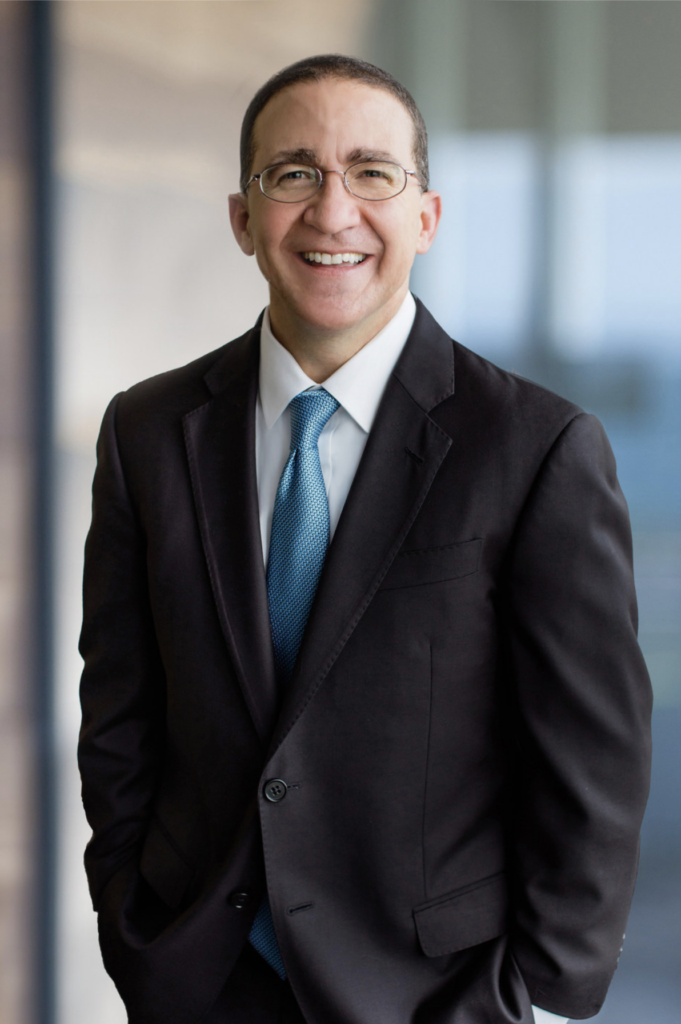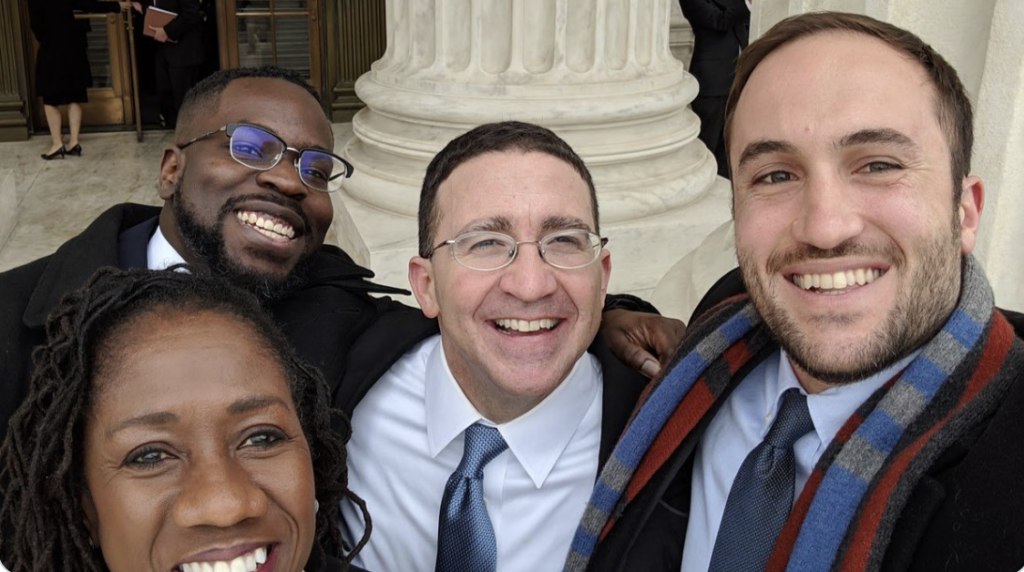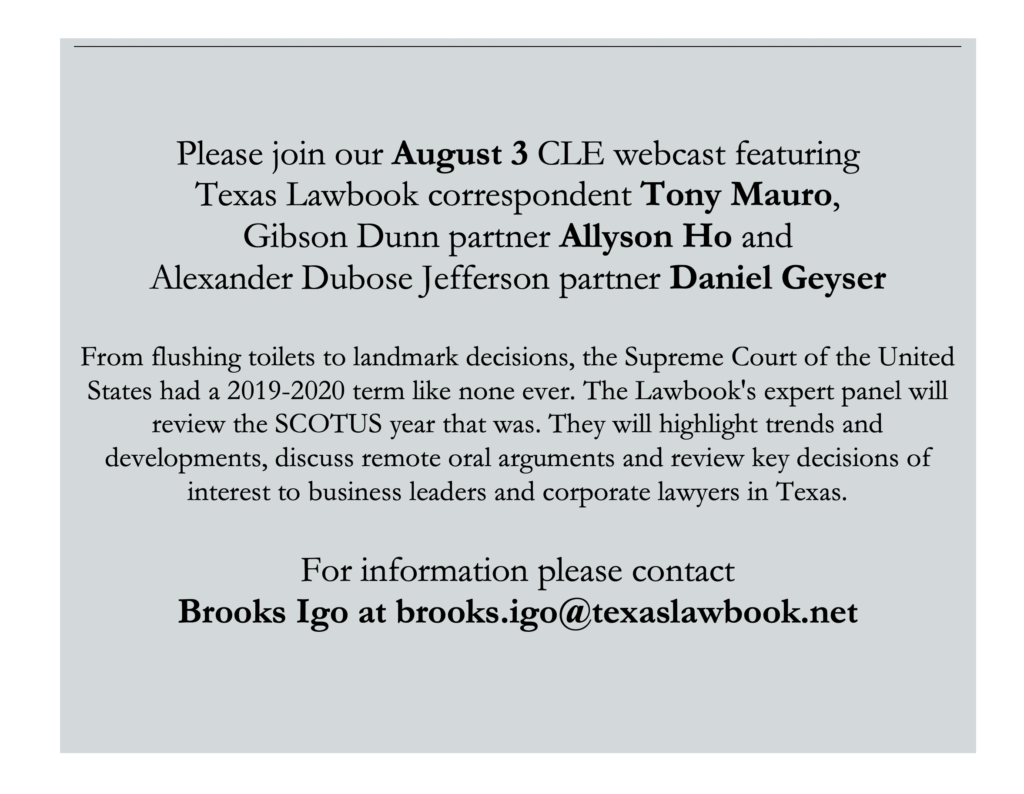After stints at law firms large and small in Dallas and elsewhere, Dan Geyser launched his solo practice two years ago.
It was a risky gamble by any measure, but especially because he was targeting his practice on U.S. Supreme Court and federal appeals court litigation. It’s not easy when your favored courthouse is more than 1,300 miles away, but it can be done.

Geyser loved working solo, telling a reporter at the time that “I prefer to do my own research and write my own briefs.” And soon his practice was going gangbusters. Clients flowed in, and he argued five Supreme Court cases in two years – a large number for even the most sought-after Supreme Court practitioners.
Add those five arguments to four he took on from Dallas at the Stris & Maher law firm, and Geyser appears to be accurate when he states that he has argued more Supreme Court cases in private practice than any other currently active lawyer in Texas.
“It was going great,” Geyser told The Texas Lawbook. In addition to the challenging work, he said, “I was doing better financially than I had at any other firm in my career.”
But on June 16, Geyser suddenly switched gears. The Texas-based appellate firm Alexander Dubose & Jefferson (ADJ) announced that Geyser was joining the firm’s Dallas office to become chair of the firm’s U.S. Supreme Court and federal appellate practice with a focus on “complex and high-stakes appellate litigation.”
What happened?
“I hit an inflection point where I was too busy to keep working alone,” the 43-year-old Geyser said. “I realized my choice was either to add to my own team or to join an existing team. The challenge was simply trying to keep up with the flow of work at the same time as running the firm. It’s amazing to me the amount of time it takes to do even the simple steps to maintain a professional corporation under Texas law.”
Though, he said, “there were great things about having a solo practice – I loved it,” Geyser’s thinking began to change in December. That was when he was leading a CLE presentation on the art and science of attracting the Supreme Court’s attention with a petition.
It so happened that Doug Alexander, a founder of ADJ, was working on a petition, and he asked Geyser to look it over. Geyser did just that. “We had so much fun working on his petition,” he said. They continued the conversation over dinner at Sachet in Dallas. “That’s where it started.”
It turned out that ADJ, a top-tier appellate firm with 17 lawyers including 11 partners, was interested in expanding its Supreme Court and appellate court practice, though Geyser said, “they already had a good foothold. It was an ideal match.”
Three of ADJ’s lawyers had already argued before the U.S. Supreme Court. Former Supreme Court Chief Justice Wallace Jefferson had two arguments under his belt, while William Boyce and Charles Frazier argued one each.
Geyser met with Frazier and other partners at the firm, including Kevin Dubose and Robert Dubose, and the prospect of moving to ADJ made more and more sense. “For me, it was perfect timing and a perfect fit.”
He learned that some of the firm’s lawyers operated as he did as a solo practitioner, researching and writing their own briefs. Geyser pointed to Doug Alexander’s web profile, which states that “Doug still writes his own briefs and works, hands-on, with peers and clients” even though he has been in practice for nearly 40 years.

“My philosophy on that hasn’t changed a bit,” Geyser said. “I just happened to find a group that shares that philosophy but that also has the bench available so that when you do get too busy, you can divide up a brief.”
Geyser envisions that at ADJ he’ll spend 40% of his time on U.S. Supreme Court matters and 60% on federal appeals court cases, with a dollop of state appellate court cases, as needed. Beyond that, Geyser says, “It’s a distinct possibility that, over time, we’ll add lawyers to bolster the SCOTUS practice. But the firm’s bench is already so deep that we’re perfectly positioned, today, to launch the practice at an optimal trajectory.”
ADJ managing partner Marcy Hogan Greer said in a statement that Geyser’s arrival “will take our federal appellate practice to the next level.… We are honored to have such a brilliant, accomplished, and genuinely delightful attorney joining our team.”

Greer is not the only one who thinks the same about the cheerful, upbeat Geyser. Sarah Harrington, a Supreme Court specialist at Goldstein & Russell, said “Dan is among the best appellate counsel I have had the pleasure of arguing against and on the same side with. He is a creative thinker and excellent writer. And he may well be the nicest person you could ever hope to meet.”
Born in California, Geyser planted Texas roots in 2007. After Harvard Law School, a clerkship with former Ninth Circuit Justice Alex Kozinski, and turns at Robbins, Russell, Englert, Orseck, Untereiner & Sauber, as well as Munger, Tolles & Olson, Geyser headed to the Texas solicitor general’s office as a way to learn and develop as an appellate expert. He was hired by R. Ted Cruz, then the Texas SG and now a U.S. senator. After nearly four years in Austin, Geyser was recruited by James Ho, also a former Texas SG, to join Gibson, Dunn & Crutcher. Geyser went from Gibson Dunn to McKool Smith and then Stris & Maher before going solo.
At various stops along the way, interestingly, Geyser’s younger brother Douglas Geyser has followed in his footsteps. Their father Lewis Geyser was an attorney, so the law was a natural path for both siblings. Both were interested in appellate practice. Doug Geyser, 38, said in an interview that the brothers were close, and “when Dan told me he was excited about his job, I would get excited, too.”
So Doug worked at the Texas SG’s office a few years after his brother had left, and then Doug went to Stris & Maher while his brother was still there. “I enjoyed working with him,” Doug said, even though colleagues “would sometimes call me Dan.” Doug Geyser is still at Stris & Maher as a member of the firm’s U.S. Supreme Court and appellate practice.
“We’re very similar,” Doug Geyser said. Asked how they might be different, Doug said, “He’s smarter than I am, probably. But I’m taller than he is. I’m happy about that.”
